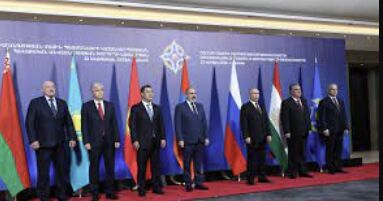Armenia's Absence and Growing Tensions Highlight Fractures in Russian-Led Security Group
The Collective Security Treaty Organization (CSTO) summit in Belarus was marred by the absence of Armenia, which voiced dissatisfaction with the organization's support in the Nagorno-Karabakh conflict. The strained relations between Armenia and Russia, as well as the deployment of nuclear weapons to Belarus, raise concerns over regional security and highlight the waning influence of the Kremlin in its former Soviet allies.
A Russian-dominated security grouping, the Collective Security Treaty Organization (CSTO), held a summit in Belarus on Thursday, but one of its key members, Armenia, was conspicuously absent. Armenia has expressed frustration over what it perceives as a lack of support from the organization in the Nagorno-Karabakh conflict. Russian President Vladimir Putin, speaking at the summit, praised the CSTO's role in securing peace and stability in the region. However, Armenian Prime Minister Nikol Pashinyan decided to snub the summit, citing dissatisfaction with the organization. Despite this, Armenian officials have emphasized that they do not plan to leave the grouping entirely. Armenia has previously canceled joint drills and ignored ministerial meetings of the CSTO.
The country has accused Russian peacekeepers, who were deployed to Nagorno-Karabakh after a 2020 war, of failing to prevent Azerbaijan's reclamation of the region in a swift attack. Moscow has rejected these accusations, asserting that its troops did not have the authority to intervene. The strained relations between Armenia and Russia have been further exacerbated by mutual accusations. Russia has accused the Armenian government of leaning towards the West, while Armenia feels that Russia's support has been lacking. This growing dispute reflects a waning influence of the Kremlin on its former Soviet allies. Kremlin spokesperson Dmitry Peskov expressed regret over Armenia's absence from the summit, emphasizing the hope that Armenia remains a strategic partner and ally.
However, Belarusian President Alexander Lukashenko, the host of the summit, openly criticized Armenia, suggesting that some of its actions had been provocative. Lukashenko, a staunch ally of Russia, has relied on Russian subsidies and support throughout his rule. Speaking after the summit, Lukashenko praised the declared deployment of Russian tactical nuclear weapons to Belarus earlier this year. He argued that only the presence of such powerful weapons could guarantee security in the region. This move marks another step in the Kremlin's nuclear saber-rattling over its invasion of Ukraine and is a clear attempt to discourage Western support for Ukraine.
The absence of Armenia from the CSTO summit and the growing tensions between Armenia and Russia highlight the complex dynamics within the Russian-dominated security grouping. It also underscores the challenges faced by the Kremlin in maintaining influence over its former Soviet allies. With the deployment of tactical nuclear weapons to Belarus, the region faces heightened security concerns, further escalating the tensions between Russia and the West.




